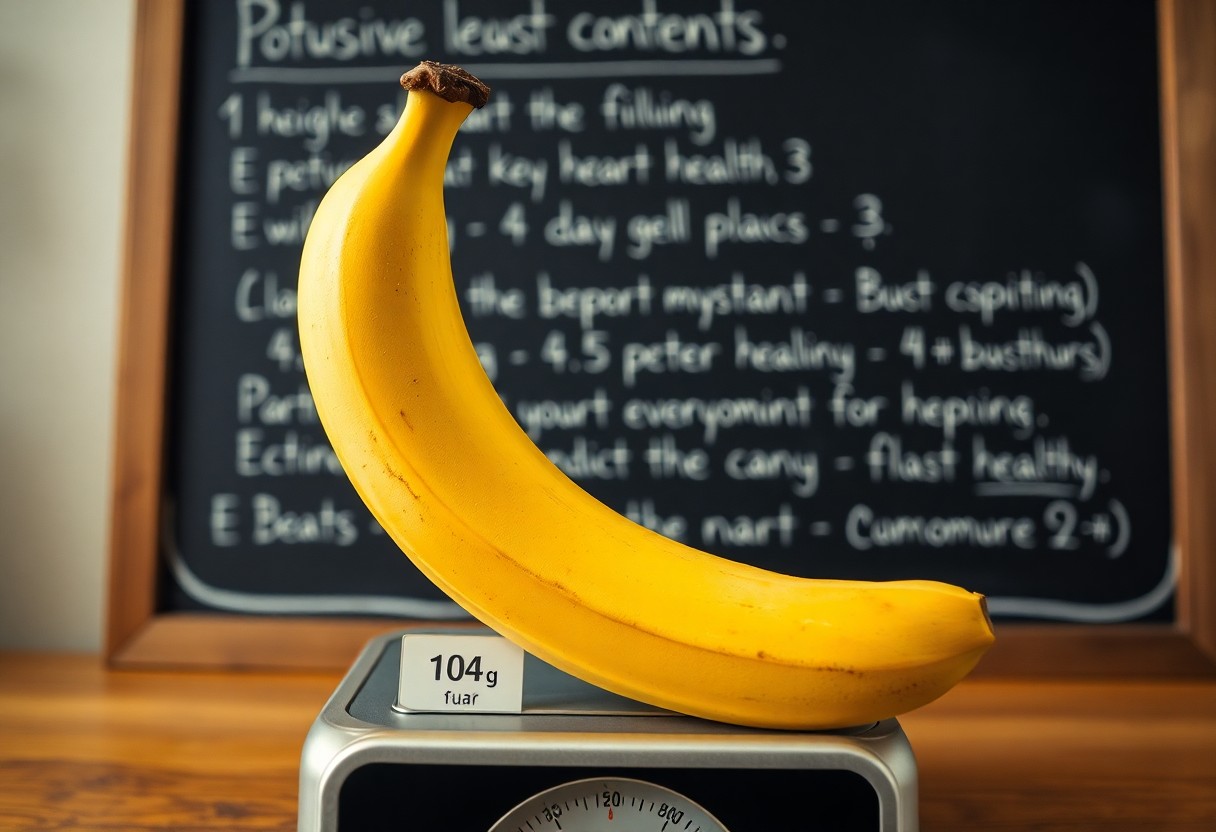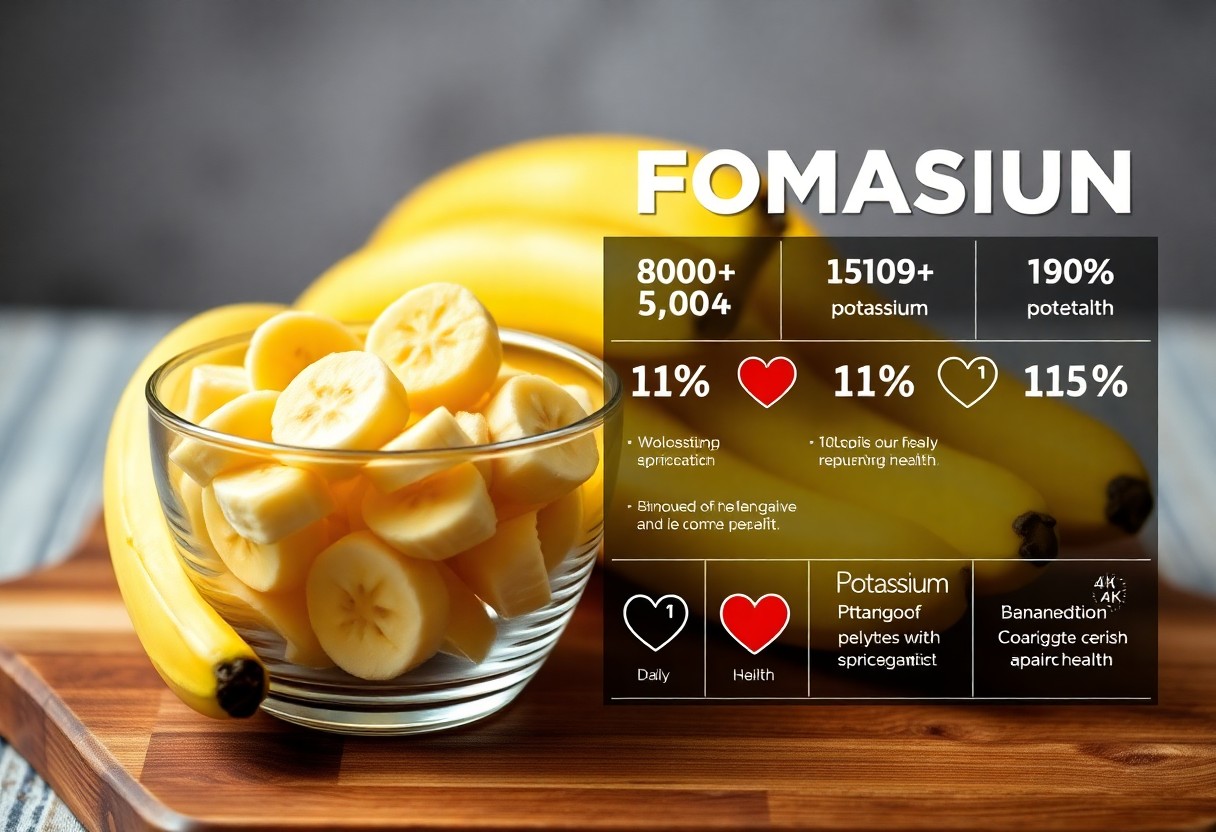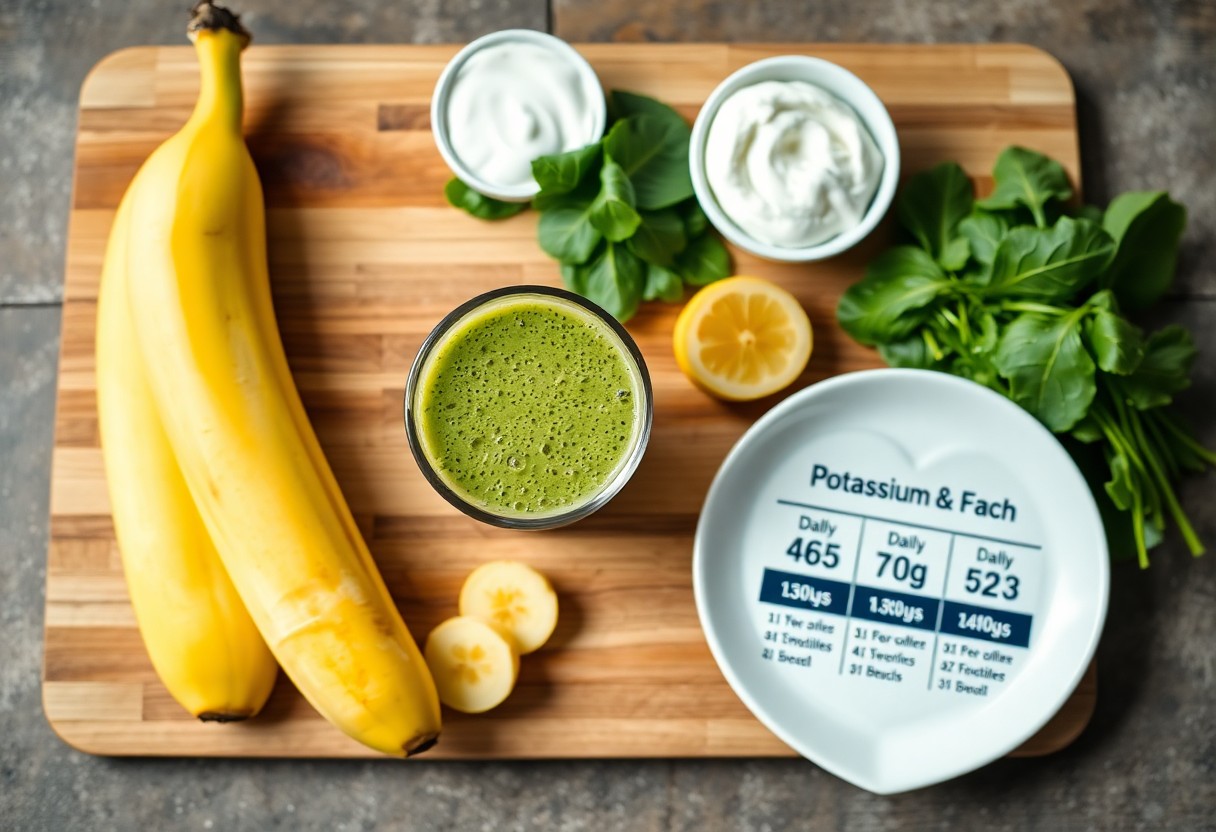Heart health is significantly influenced by your diet, and bananas are an excellent source of potassium, which plays a vital role in maintaining proper blood pressure and supporting cardiovascular function. By incorporating bananas into your meals, you can enhance your potassium intake and reap numerous nutritional benefits. According to this 10 Healthy Reasons to Eat a Banana Every Day, understanding the daily value of potassium can help you make informed dietary choices that promote better heart health.

Key Takeaways:
- Bananas are rich in potassium, a vital mineral that supports muscle function and regulates blood pressure.
- The daily value of potassium recommended for adults is around 4,700 mg, with bananas providing about 10% of that in a medium-sized fruit.
- High potassium intake is linked to reduced risks of stroke and heart disease, promoting overall cardiovascular health.
Nutritional Benefits of Potassium in Bananas
Potassium is a key nutrient found abundantly in bananas, offering numerous health benefits. Each medium banana provides about 422 mg of potassium, which helps maintain proper muscle function, improve nerve transmission, and regulate fluid balance in your body. This mineral also plays a significant role in counteracting sodium's effects, supporting healthy blood pressure levels and reducing the risk of cardiovascular issues.
Role of Potassium in the Body
Potassium acts as an electrolyte, imperative for maintaining your body's fluid balance and supporting muscle contractions. It helps transmit electrical signals in the heart and nervous system, ensuring effective communication between nerves and muscles. Adequate potassium intake is critical for lowering the risk of hypertension and supporting overall cardiovascular health.
Comparison with Other Fruits
While numerous fruits provide potassium, bananas stand out due to their convenience and high content. A medium banana contains more potassium than many other fruits, making it an excellent choice for a quick snack. For example, a medium orange offers about 237 mg of potassium, and a cup of strawberries contains approximately 233 mg. Bananas are thus a preferred option for individuals seeking to boost their potassium intake without excessive calories.
Comparison of Potassium Content in Fruits| Fruit | Potassium Content (mg) |
|---|---|
| Banana (1 medium) | 422 |
| Orange (1 medium) | 237 |
| Strawberries (1 cup) | 233 |
| Avocado (1 medium) | 487 |
Choosing bananas can help you easily meet your potassium needs due to their high levels and availability. Although avocados offer slightly more potassium per serving, bananas provide a balance of nutrients, fiber, and convenience, making them a practical addition to your diet for heart health and overall well-being.
Daily Value of Potassium
The Daily Value (DV) of potassium is set at 4,700 mg for adults, highlighting its importance for overall health. This mineral plays a key role in maintaining proper fluid balance, nerve function, and muscle contractions. Eating potassium-rich foods like bananas can help you meet this requirement and support your cardiovascular health. For more insights, check out this article on Don't go bananas – but maybe eat one.
Recommended Daily Intake
You should aim to consume the recommended daily intake of potassium to reap its numerous health benefits. While the general guideline is 4,700 mg per day, individual needs may vary based on age, sex, and level of physical activity. Adjusting your intake according to your specific circumstances ensures your body gets the potassium it requires for optimal function.
Sources of Potassium
Potassium is plentiful in various fruits and vegetables, making it easy to incorporate into your diet. Apart from bananas, favorite sources include avocados, oranges, spinach, sweet potatoes, and tomatoes. Many beans and legumes also serve as excellent potassium contributors, helping you maintain a balanced intake through diverse food options.
You can get potassium from a wide range of foods, making it simple to include in your daily meals. Foods such as white beans and lentils provide substantial amounts, while nuts, dairy products, and fish like salmon also offer significant potassium levels. Integrating these foods into your diet not only boosts your potassium intake but also contributes to overall nutritional richness, enhancing heart health and your well-being.

Heart Health and Potassium
Potassium plays a vital role in maintaining heart health, primarily by regulating various physiological functions important for optimal cardiovascular performance. Adequate potassium intake can help maintain a healthy heartbeat and support overall cardiovascular function, making bananas a beneficial addition to your diet.
Effects on Blood Pressure
High potassium levels help counteract the effects of sodium, which is linked to increased blood pressure. By promoting efficient fluid balance and supporting vasodilation, potassium contributes to lower blood pressure readings, reducing the risk of hypertension.
Role in Cardiovascular Health
Potassium enhances cardiovascular health by improving blood vessel function and decreasing muscle tension in arterial walls. A diet rich in potassium, including bananas, has been associated with a reduced risk of stroke and other heart-related diseases. Research shows that individuals who consume adequate potassium exhibit lower risks of heart complications, supporting the protective nature of this important mineral.
Additional Health Benefits of Bananas
Bananas offer a myriad of health benefits beyond potassium. Their rich blend of vitamins, minerals, and fiber supports overall health, making them an excellent snack choice. Regular consumption can improve mood and energy levels due to their natural sugars and carbohydrate content, while antioxidants help combat oxidative stress. Eating bananas may also aid in reducing the risk of certain diseases, including type 2 diabetes and osteoporosis, contributing to a balanced diet.
Other Nutrients in Bananas
In addition to potassium, bananas are packed with imperative nutrients such as vitamin C, vitamin B6, and dietary fiber. Vitamin C acts as an antioxidant, promoting skin health and boosting your immune system. Vitamin B6 aids in brain function and the production of neurotransmitters, while fiber supports digestive health and can help maintain stable blood sugar levels.
Benefits for Digestive Health
The high fiber content in bananas plays a significant role in promoting digestive health. This soluble fiber helps regulate bowel movements and prevents constipation, ensuring your digestive system functions smoothly.
Specifically, bananas contain prebiotic fiber, which fosters the growth of beneficial gut bacteria. A healthy gut microbiome is linked to improved digestion and enhanced nutrient absorption. The pectin in bananas also aids digestion by expanding in water, contributing to a feeling of fullness. Regularly incorporating bananas into your diet can lead to more regular bowel health and decrease the likelihood of gastrointestinal issues.
Potential Risks of Excessive Potassium
Excessive potassium intake can lead to potential health risks, particularly for individuals with certain medical conditions. While potassium is important for numerous bodily functions, an overload can result in hyperkalemia, a condition where potassium levels in the blood become dangerously high. This highlights the importance of balancing potassium consumption to reap its benefits without experiencing adverse effects.
Hyperkalemia
Hyperkalemia occurs when potassium levels exceed 5.0 mmol/L in the blood, leading to symptoms like muscle weakness, fatigue, and heart palpitations. Severe cases can result in cardiac arrest or other life-threatening complications. Certain factors, such as kidney dysfunction or medications that hinder potassium excretion, can exacerbate this condition. Regular monitoring is key for those at risk.
Who Should Monitor Intake
Your potassium intake should be closely monitored if you have kidney disease, are on medications like ACE inhibitors or potassium-sparing diuretics, or suffer from adrenal gland disorders. These conditions can impair your body's ability to regulate potassium properly, increasing the likelihood of developing hyperkalemia. Consulting a healthcare provider for personalized recommendations is important in these scenarios.

Ways to Incorporate Bananas into Your Diet
Adding bananas to your diet is both easy and versatile. You can enjoy them raw as a quick snack or incorporate them into smoothies, baked goods, and breakfast dishes. Their natural sweetness can enhance the flavor of various meals, making them a delightful addition to your nutritional routine. With a bit of creativity, you can seamlessly integrate bananas into your daily meals.
Simple Recipes
Make the most of bananas with simple recipes that showcase their flavor. A banana smoothie is a quick option: blend one banana with yogurt, milk, and a splash of honey for a nutritious breakfast. For a warm treat, slice bananas and sauté them with cinnamon and a bit of butter, serving over oatmeal or pancakes to elevate your morning fare.
Snack Ideas
With respect to snacking, bananas shine due to their convenience and taste. Pair banana slices with nut butter for a protein-packed, energy-boosting snack. Try freezing bananas to enjoy as a cool treat on hot days or blend them into yogurt for a creamy dessert alternative that satisfies your sweet tooth.
Exploring banana snack ideas can lead to many delicious combinations. You could mash a banana and spread it on whole-grain toast, topping it with chia seeds for added fiber. For a refreshing twist, freeze banana slices and blend them with a splash of coconut milk to create a simple banana ice cream. These snacks not only taste great but also provide imperative nutrients to keep you energized throughout the day.
Conclusion
With these considerations, incorporating bananas into your diet can significantly enhance your potassium intake, necessary for maintaining your heart health. By meeting the recommended daily value of potassium, you support proper muscle function, regulate blood pressure, and reduce the risk of heart disease. Bananas offer a delicious and convenient way to ensure you get this vital nutrient, making them an excellent addition to your daily regimen for overall well-being.
FAQ
Q: How much potassium is found in a banana?
A: A medium-sized banana contains about 422 mg of potassium, which contributes significantly to the daily recommended intake.
Q: What is the daily value of potassium recommended for adults?
A: The daily value of potassium recommended for adults is 4,700 mg. Including bananas in your diet can help meet this requirement.
Q: What are the nutritional benefits of potassium in bananas?
A: Potassium in bananas aids in regulating blood pressure, supports muscle function, and helps maintain fluid balance in the body.
Q: How does potassium support heart health?
A: Potassium helps lower blood pressure and reduces the risk of stroke, promoting overall heart health by balancing sodium levels and reducing strain on blood vessels.
Q: Can potassium in bananas help with muscle cramps?
A: Yes, the potassium in bananas can help alleviate muscle cramps, especially after exercise, by maintaining proper muscle function and preventing electrolyte imbalance.

0 Comments